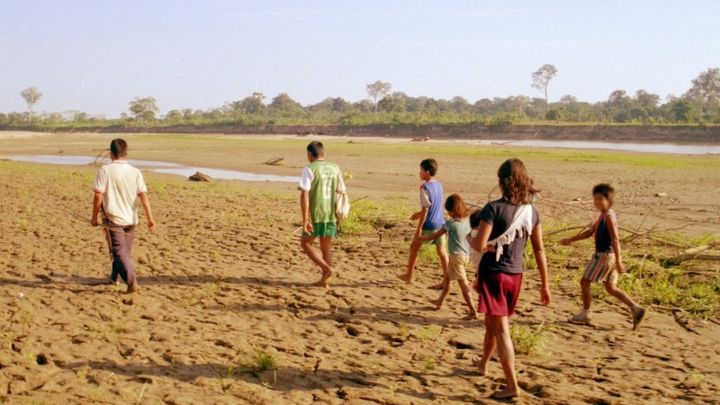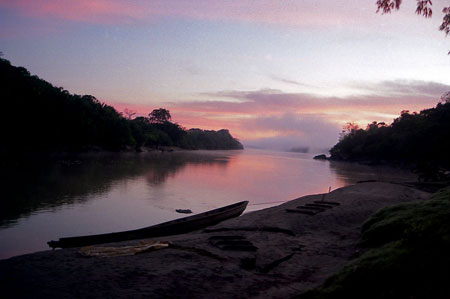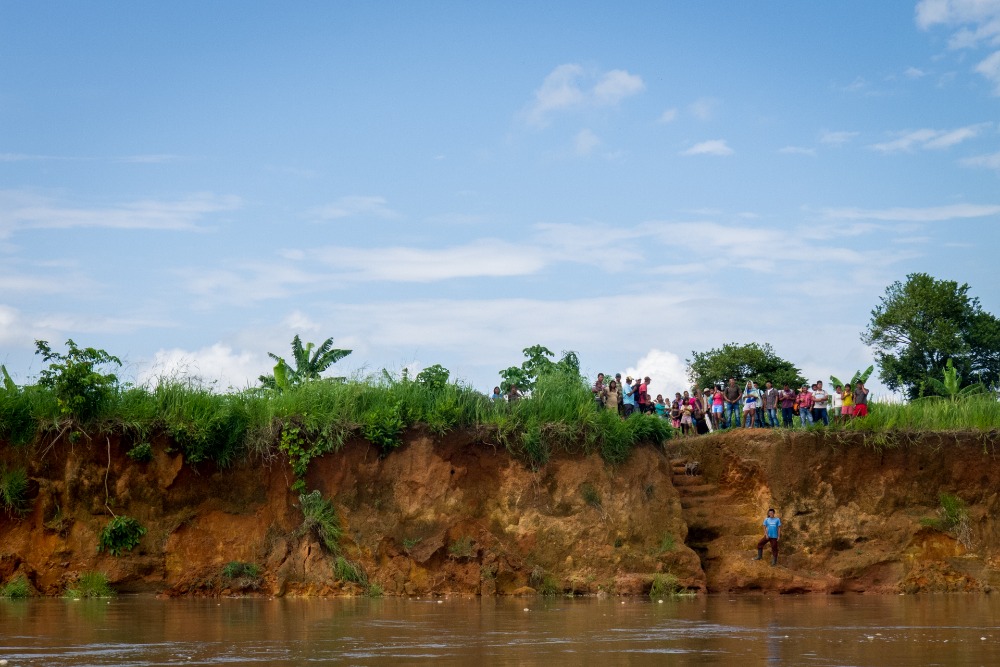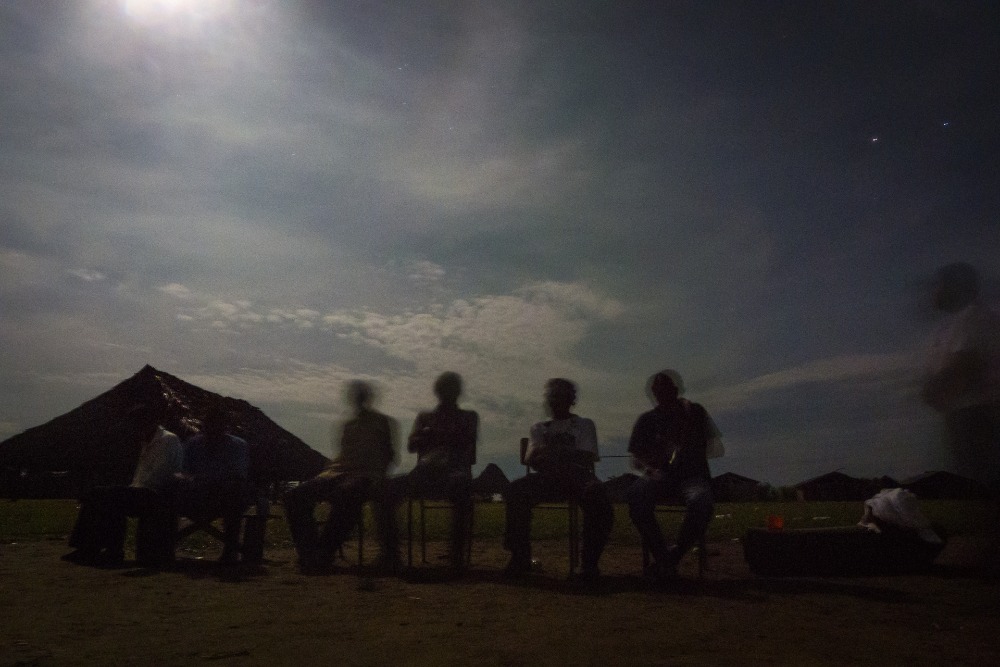
Fighting clichés & claiming rights!
Donation protected
“White men are regarded as white men.
But the indigenous are treated like less than a man because they’re indigenous... they look at us as if they were looking at dogs!"
(indigenous leader)
"So... is it true that indigenous are cannibals?"
(7th grade student)
Just 40 years ago, indigenous people in the Eastern region of Colombia were hunted and killed like wild animals because for some of the settlers they represented a menace to their cattle farms. Today, even though the open killings have stopped, other forms of violent discrimination are still very much alive. In the case of the Jiw people this is still very evident. To a large extent they are conceived by the non-indigenous population in derogatory terms as violent, dirty and savage thieves and beggars.
This project aims to question these and many other stereotypes about indigenous people.
My intention is to develop a six-month photographic workshop with a group of indigenous leaders from the Jiw people who live along the Guaviare River in the Colombian Amazon. After learning the basics of how to operate a camera, they will engage in a deep visual exploration of what it means to be an indigenous person in the 21st century and how the stereotypes about indigeneity impact their daily lives. By the end of the project, the images produced by the Jiw leaders will constitute a public exhibition in the region and in Bogotá (the capital of Colombia) that will include public talks and forums about the images.
The production and exhibition of photographs made by the Jiw themselves aims to foster new connections among the indigenous and the non-indigenous worlds, imagine new responses to outdated stereotypes, make visible their social problems, and strengthen the position of the Jiw people as political subjects embedded in complex webs of relationships.
Your contribution will be used to buy 10 cameras and to finance the printings and montage of the final exhibition. This project will use easy to operate point and shoot cameras. But because of the natural environment in which the Jiw live (average temperature of 77 °F and above 80% humidity) the cameras need to be water and dust proof.
Who are the Jiw people?
The Jiw (formerly known as Guayaberos) are an indigenous group of a little more than 2000 people who mostly live in small settlements along the Guaviare River in the western portion of the Colombian Amazonia. Since their first encounter with western society at the beginning of the 20th century, the Jiw have been forced to struggle for their lives and their cultural survival. They were displaced from the land of their ancestors due to commercial rubber extraction, hunting and fishing that razed the forests, the expansion of new settlers and their cattle farms, the farming of coca plants to produce cocaine, and the consequent fumigations with dangerous chemicals (like glyphosate) to destroy the illegal plantations.
On top of facing the harsh conditions of living in a region afflicted by a decades-long internal armed conflict, they have also faced the discrimination of the non-indigenous population.
To learn more about the Jiw's difficult situation, see:
To learn more about the Jiw difficult situation see:
United Nations High Commissioner for Refugees - UFHCR - Colombia Situation-Indigenous people (PDF document).
UNHCR- Colombia's indigenous in danger of extinction
Chicken pox threatens life of indigenous community (In Spanish)
Thank you very much for your help!
About me:
My name is David Gómez Manrique. I have been in contact with the Jiw since 2005. In 2010 I began investigating the representations of the indigenous people in relation to the central state of Colombia for my PhD research at the National University in Colombia. Jiw leaders have agreed to participate in my photographic project and contribute their thoughts to my research. This project will be part of my ongoing PhD research. Any use of the images will be first discussed with the Jiw photographers themselves.
You can check my CV here: David CV (In Spanish). And some of my photographic work here: http://www.octoacto.org/David-Gomez (Texts in Spanish).
 The Guayabero River
The Guayabero River
 Barrancón Indigenous reservation, by the Guaviare River
Barrancón Indigenous reservation, by the Guaviare River
 Taking Ayahuasca and singing all night to keep away diseases
Taking Ayahuasca and singing all night to keep away diseases
 Dry lands at one of thes settlements.
Dry lands at one of thes settlements.
But the indigenous are treated like less than a man because they’re indigenous... they look at us as if they were looking at dogs!"
(indigenous leader)
"So... is it true that indigenous are cannibals?"
(7th grade student)
Just 40 years ago, indigenous people in the Eastern region of Colombia were hunted and killed like wild animals because for some of the settlers they represented a menace to their cattle farms. Today, even though the open killings have stopped, other forms of violent discrimination are still very much alive. In the case of the Jiw people this is still very evident. To a large extent they are conceived by the non-indigenous population in derogatory terms as violent, dirty and savage thieves and beggars.
This project aims to question these and many other stereotypes about indigenous people.
My intention is to develop a six-month photographic workshop with a group of indigenous leaders from the Jiw people who live along the Guaviare River in the Colombian Amazon. After learning the basics of how to operate a camera, they will engage in a deep visual exploration of what it means to be an indigenous person in the 21st century and how the stereotypes about indigeneity impact their daily lives. By the end of the project, the images produced by the Jiw leaders will constitute a public exhibition in the region and in Bogotá (the capital of Colombia) that will include public talks and forums about the images.
The production and exhibition of photographs made by the Jiw themselves aims to foster new connections among the indigenous and the non-indigenous worlds, imagine new responses to outdated stereotypes, make visible their social problems, and strengthen the position of the Jiw people as political subjects embedded in complex webs of relationships.
Your contribution will be used to buy 10 cameras and to finance the printings and montage of the final exhibition. This project will use easy to operate point and shoot cameras. But because of the natural environment in which the Jiw live (average temperature of 77 °F and above 80% humidity) the cameras need to be water and dust proof.
Who are the Jiw people?
The Jiw (formerly known as Guayaberos) are an indigenous group of a little more than 2000 people who mostly live in small settlements along the Guaviare River in the western portion of the Colombian Amazonia. Since their first encounter with western society at the beginning of the 20th century, the Jiw have been forced to struggle for their lives and their cultural survival. They were displaced from the land of their ancestors due to commercial rubber extraction, hunting and fishing that razed the forests, the expansion of new settlers and their cattle farms, the farming of coca plants to produce cocaine, and the consequent fumigations with dangerous chemicals (like glyphosate) to destroy the illegal plantations.
On top of facing the harsh conditions of living in a region afflicted by a decades-long internal armed conflict, they have also faced the discrimination of the non-indigenous population.
To learn more about the Jiw's difficult situation, see:
To learn more about the Jiw difficult situation see:
United Nations High Commissioner for Refugees - UFHCR - Colombia Situation-Indigenous people (PDF document).
UNHCR- Colombia's indigenous in danger of extinction
Chicken pox threatens life of indigenous community (In Spanish)
Thank you very much for your help!
About me:
My name is David Gómez Manrique. I have been in contact with the Jiw since 2005. In 2010 I began investigating the representations of the indigenous people in relation to the central state of Colombia for my PhD research at the National University in Colombia. Jiw leaders have agreed to participate in my photographic project and contribute their thoughts to my research. This project will be part of my ongoing PhD research. Any use of the images will be first discussed with the Jiw photographers themselves.
You can check my CV here: David CV (In Spanish). And some of my photographic work here: http://www.octoacto.org/David-Gomez (Texts in Spanish).
 The Guayabero River
The Guayabero River Barrancón Indigenous reservation, by the Guaviare River
Barrancón Indigenous reservation, by the Guaviare River Taking Ayahuasca and singing all night to keep away diseases
Taking Ayahuasca and singing all night to keep away diseases Dry lands at one of thes settlements.
Dry lands at one of thes settlements.Organizer
David Gomez
Organizer
Arlington, MA